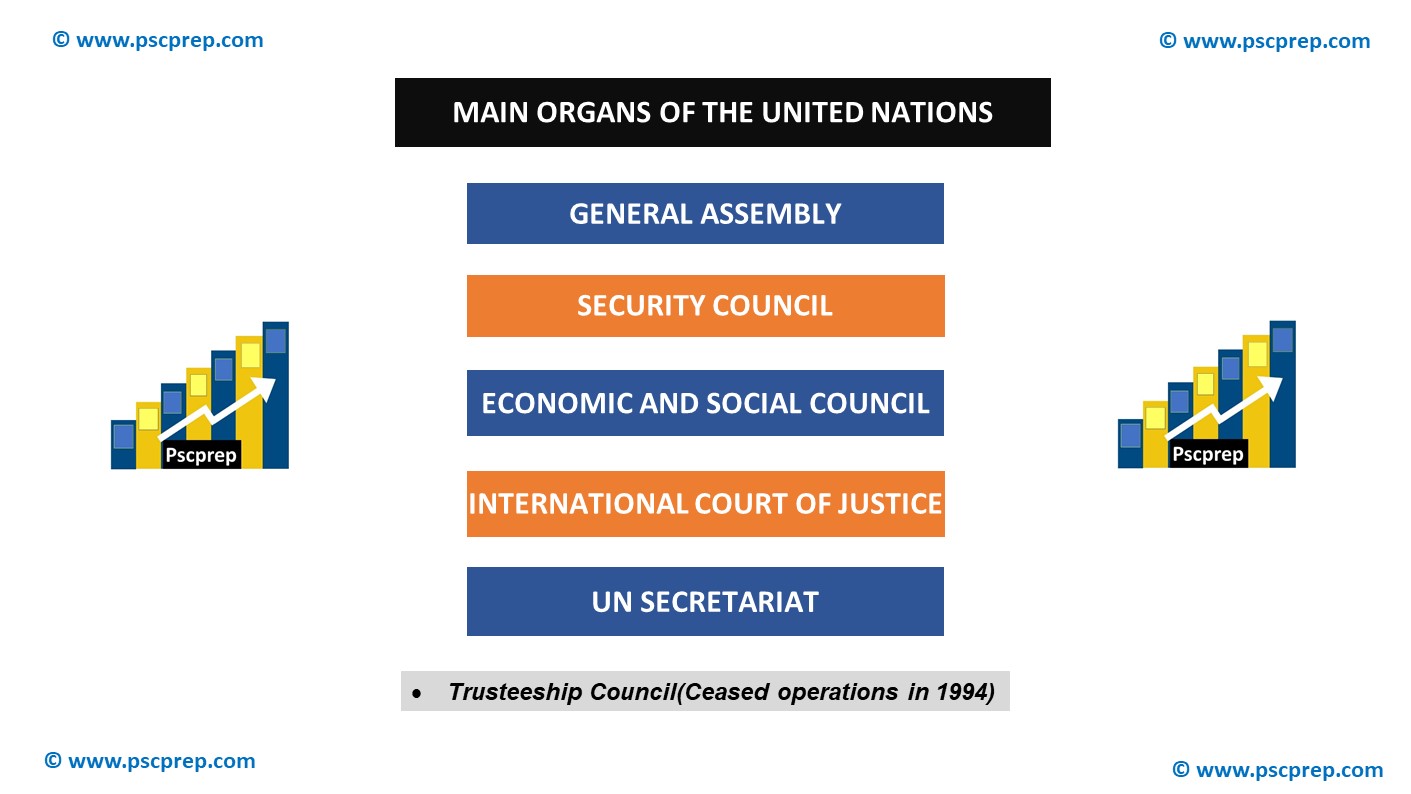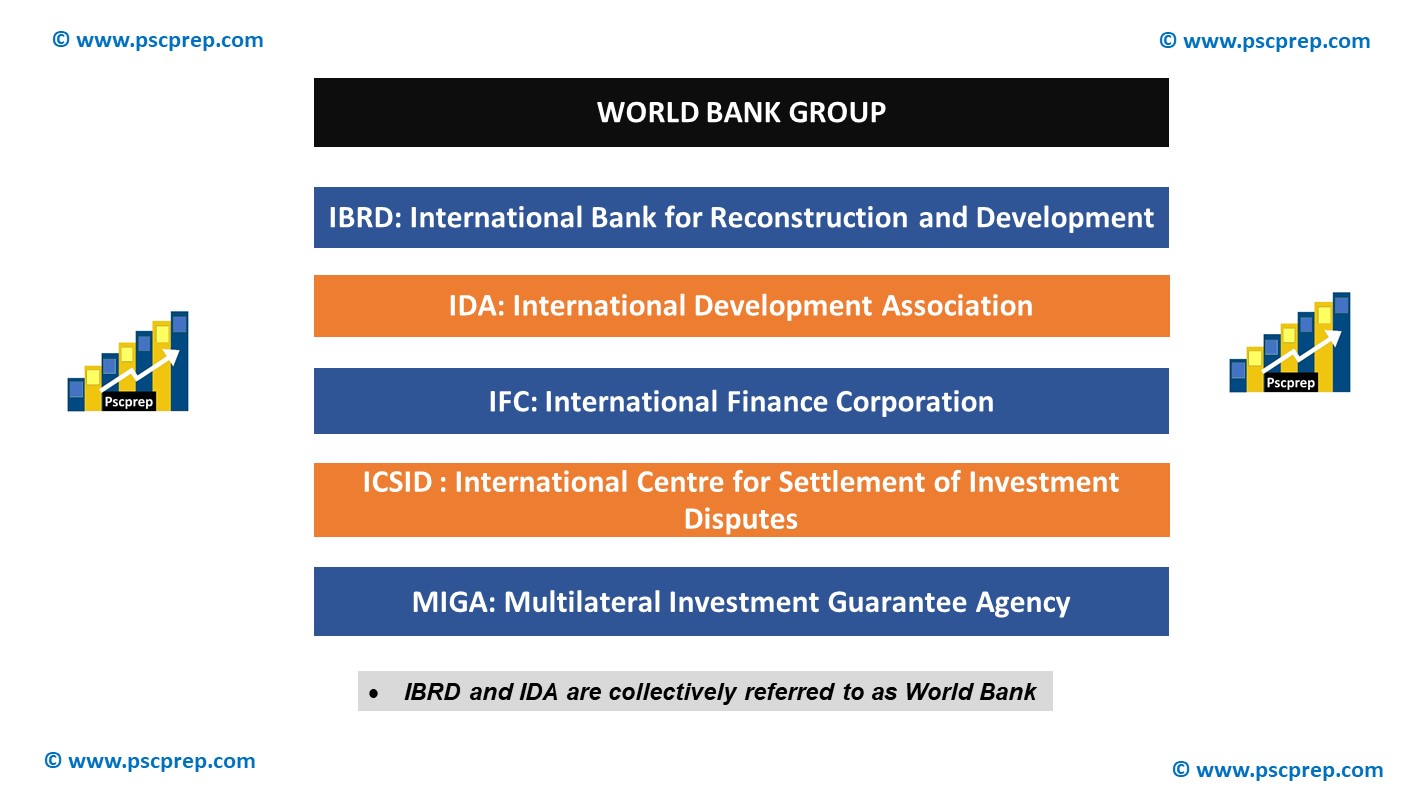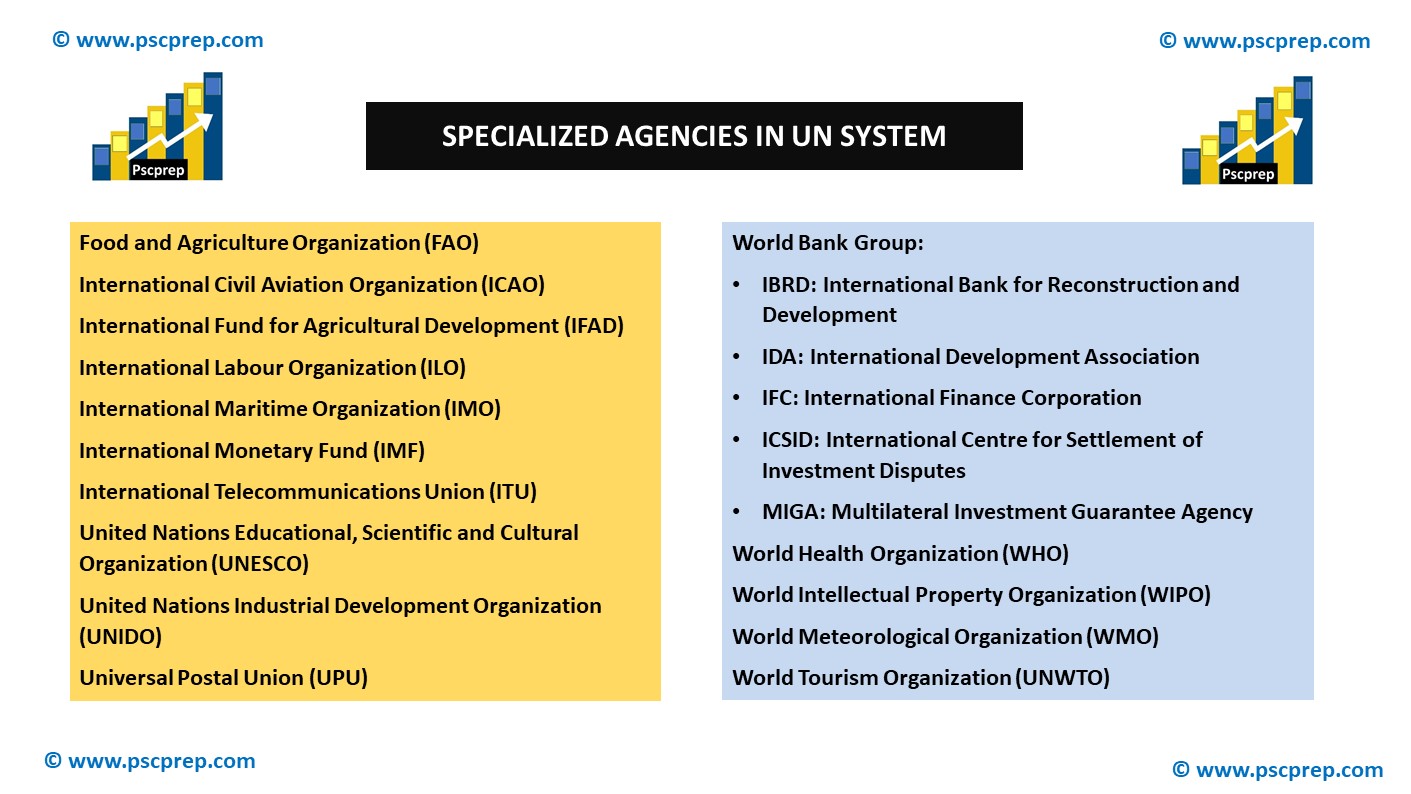United Nations for UPSC – Overview
United Nations for UPSC is a topic that is asked almost every year in either prelims or mains. Given its importance as an international organization founded in 1945 as a replacement for the League of Nations. It is currently made up of 193 Member States. The organization is financed by assessed and voluntary contributions from its member states. The headquarters of the UN is in New York and other main offices are situated in Geneva, Nairobi, and Vienna.
United Nations for UPSC – Objective
Its objectives include maintaining international peace and security, promoting human rights, fostering social and economic development, protecting the environment, and providing humanitarian aid in cases of famine, natural disaster, and armed conflict.
United Nations for UPSC: Organs
The main organs of the UN also referred to as UN system include:
- General Assembly
- Security Council
- Economic and Social Council
- Trusteeship Council(Ceased operations in 1994)
- International Court of Justice
- UN Secretariat
Four of the five principal organs are located at the main UN Headquarters in New York. The International Court of Justice is located in The Hague.
United Nations for UPSC: General Assembly: The General Assembly (GA) is the main deliberative, policymaking and representative organ of the UN. Each of the 193 Member States of the United Nations is a member of the General Assembly. The General Assembly meets in regular yearly sessions, but emergency sessions can also be called. States are admitted to membership in the UN by a decision of the General Assembly upon the recommendation of the Security Council. Decisions on important questions, such as those on peace and security, admission of new members and budgetary matters, require a two-thirds majority. Decisions on other questions are by simple majority. Each country has one vote. Apart from approval of budgetary matters, resolutions are not binding on the members. The Assembly may make recommendations on any matters within the scope of the UN, except matters of peace and security that are under consideration by the Security Council. It also elects the non-permanent members of the United Nations Security Council, all members of ECOSOC, the UN Secretary General (following his/her proposal by the UNSC), and the fifteen judges of the International Court of Justice (ICJ).
United Nations for UPSC: United Nations Security Council: It comprises of fifteen members which includes five permanent members with veto power and ten elected members. It is responsible for the maintenance of international peace and security; including the establishment of peacekeeping operations, the establishment of international sanctions, and the authorization of military action. It may adopt compulsory resolutions.
United Nations for UPSC: United Nations Secretariat: It is organized along departmental lines, with each department or office having a distinct area of action and responsibility. Offices and departments coordinate with each other to ensure cohesion as they carry out the day to day work of the Organization in offices and duty stations around the world. At the head of the United Nations Secretariat is the Secretary-General.

United Nations for UPSC: UN System/UN Family
The UN system, also known unofficially as the “UN family”, is made up of the UN itself and many affiliated programmes, funds, and specialized agencies, all with their own membership, leadership, and budget. The programmes and funds are financed through voluntary rather than assessed contributions. The Specialized Agencies are independent international organizations funded by both voluntary and assessed contributions. The organization won the Nobel Peace Prize in 2001, and a number of its officers and agencies have also been awarded the prize. Other evaluations of the UN’s effectiveness have been mixed. Some commentators believe the organization to be an important force for peace and human development, while others have called the organization ineffective, corrupt, or biased. These specialised agencies are autonomous organisations working with the United Nations and each other inter alia through the coordinating machinery of the Economic and Social Council.
Food and Agriculture Organization (FAO)
The Food and Agriculture Organization of the United Nations leads international efforts to defeat hunger, raise levels of nutrition, improve agricultural productivity, better the lives of rural populations and contribute to the growth of the world economy. FAO is the largest of the UN agencies. It was established in 1945 and its headquarters is in Rome, Italy.
International Civil Aviation Organization (ICAO)
The International Civil Aviation Organization (ICAO) was founded in 1947. It codifies the principles and techniques of international air navigation and fosters the planning and development of international air transport to ensure safe and orderly growth. Its headquarters are located in Quebec, Canada.
International Fund for Agricultural Development (IFAD)
The International Fund for Agricultural Development (IFAD) was established as an international financial institution in 1977, as one of the major outcomes of the 1974 World Food Conference and a response to the situation in the Sahel. It is dedicated to eradicating rural poverty in developing countries. Its headquarters are in Rome, Italy.
International Labour Organization (ILO)
The International Labour Organization (ILO) deals with labour issues. Its headquarters are in Geneva, Switzerland. Founded in 1919, it was formed through the negotiations of the Treaty of Versailles and was initially an agency of the League of Nations. It became a member of the UN system after the demise of the League and the formation of the UN at the end of World War II. Its secretariat is known as the International Labor Office.
International Maritime Organization (IMO)
The International Maritime Organization was established in 1948 through the United Nations to coordinate international maritime safety and related practices. Headquartered in London, United Kingdom, the IMO promotes cooperation among government and the shipping industry to improve maritime safety and to prevent marine pollution. The IMO is supported by a permanent secretariat of employees who are representative of its members.
International Monetary Fund (IMF)
International Monetary Fund (IMF) is part of the United Nations system and has a formal relationship agreement with the UN, but retains its independence. The IMF provides monetary cooperation and financial stability and acts as a forum for advice, negotiation and assistance on financial issues. It is headquartered in Washington, D.C., United States of America.
International Telecommunication Union (ITU)
The International Telecommunication Union (ITU) was established to standardize and regulate international radio and telecommunications. It was founded as the International Telegraph Union in Paris on 17 May 1865. Its main tasks include standardization, allocation of the radio spectrum, and organizing interconnection arrangements between different countries to allow international phone calls — in which regard it performs for telecommunications a similar function to what the UPU performs for postal services. It has its headquarters in Geneva, Switzerland, next to the main United Nations campus.
United Nations Educational, Scientific and Cultural Organization (UNESCO)
The United Nations Educational, Scientific and Cultural Organization (UNESCO) is a specialized agency of the United Nations established in 1946 with its headquarters in Paris, France. Its stated purpose is to contribute to peace and security by promoting international collaboration through education, science, and culture in order to further universal respect for justice, the rule of law, and the human rights and fundamental freedoms proclaimed in the UN Charter.
United Nations Industrial Development Organization (UNIDO)
United Nations Industrial Development Organization (UNIDO) is the specialized agency of the United Nations, which promotes inclusive and sustainable industrial development (ISID), headquartered in Vienna, Austria. The Organization addresses some of the most pressing issues of our time, and works to accelerate economic growth in order to bring prosperity to all while at the same time safeguarding the environment. UNIDO’s mandate is fully aligned with the global development agenda, which underlines the central role of industrialization and its importance as a key enabler for all 17 Global Goals, and especially for SDG9.
Universal Postal Union (UPU)
The Universal Postal Union (UPU), headquartered in Berne, Switzerland, coordinates postal policies between member nations, and hence the worldwide postal system. Each member country agrees to the same set of terms for conducting international postal duties.
United Nations for UPSC: World Bank Group (WBG)
The World Bank Group is part of the United Nations system and has a formal relationship agreement with the UN, but retains its independence. Its headquarters are located in Washington, D.C., United States of America. The WBG comprises a group of five legally separate but affiliated institutions.
- International Bank for Reconstruction and Development (IBRD): The IBRD makes loans to developing countries for development programs with the stated goal of reducing poverty. It is part of the World Bank Group (WBG).
- International Development Association (IDA): The IDA’s mandate is close to that of IBRD, with the focus on the poorest countries. It is part of the World Bank Group (WBG).
- International Finance Corporation (IFC): International Finance Corporation is the largest multilateral source of loan and equity financing for private sector projects in the developing world. It is part of the World Bank Group (WBG).
- the International Centre for Settlement of Investment Disputes (ICSID), established in 1965, which works with governments to reduce investment risk;
- the Multilateral Investment Guarantee Agency (MIGA), established in 1988, which provides insurance against certain types of risk, including political risk, primarily to the private sector.
The term “World Bank” generally refers to just the IBRD and IDA, whereas the term “World Bank Group” or “WBG” is used to refer to all five institutions collectively

World Health Organization (WHO)
World Health Organization: The World Health Organization (WHO) acts as a coordinating authority on international public health and deals with health and sanitation and diseases and sends medical teams to help combat epidemics. Its headquarters are at Geneva in Switzerland.
World Intellectual Property Organization (WIPO)
The World Intellectual Property Organization (WIPO) is a specialized agency of the United Nations created in 1967 and headquartered in Geneva, Switzerland. Its purpose is to encourage creative activity and to promote the protection of intellectual property throughout the world. The organization administers several treaties concerning the protection of intellectual property rights.
World Meteorological Organization (WMO)
The World Meteorological Organization (WMO) originated from the International Meteorological Organization (IMO), which was founded in 1873. Established in 1950, WMO became the specialized agency of the United Nations for modern meteorology (weather and climate), operational hydrology and related geophysical sciences. It has its headquarters in Geneva, Switzerland.
World Tourism Organization (UNWTO)
The World Tourism Organization (UNWTO or WTO) was established in 1974 in Madrid, Spain, to replace the International Union of Official Tourist Publicity Organizations (IUOTPO). UNWTO has 160 member states and 350 affiliated members representing private organizations, educational institutions and others. It is headquartered in Madrid, Spain. The World Tourism Organization serves as a forum for tourism policies and acts as a practical source for tourism know-how.

To purchase and access full preparation material for UPSC/State PSC exams fill the form below:
The package consists of summaries of curated sources for studying the most critical subjects of UPSC in the most comprehensive manner. The summaries are prepared in consultation with exam toppers and serving/retired civil servants along with our own team of experts who ensure that you refer to the most relevant content in your preparation journey.
In the current exam scenario the bigger challenge is not the lack of material but the availability of excessive material that often confuses aspirants. Hence this package is our endeavor to minimize wastage and maximize utilization of an aspirants precious time. What will also be of interest to you is the fact that unlike many other institutions we have prepared the whole package in an editable format so that you can easily edit, append, delete the notes to suit your current preparation.
Quality of the notes is our most important focus. Coming from the house of PSCPREP you can be rest assured that the notes are of the topmost quality
Read more: https://www.un.org/en/